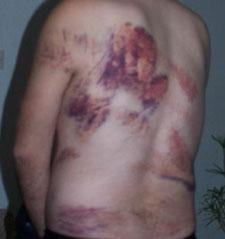The plight of many politically active gay Iranians is typified by Hamid, a 29-year-old who volunteered in the campaign of presidential candidate Mir-Hossein Mousavi.
Hamid (an alias used to protect his identity) was arrested by police in 2007 during an entrapment campaign targeting gay chat rooms. While in custody his interrogators made him sign a document confessing his homosexuality.
So when Hamid was rounded up at a pro-Mousavi demonstration in Shiraz last month authorities wasted no time making an example out of him. He was held in detention for 48 hours, where he alleges he was beaten with an electric baton. At publication time he was trying to cross the border into neighbouring Turkey and seek asylum.
The pictures he sent to Arsham Parsi, executive director of the Toronto-based Iranian Queer Railroad, highlight the bleak reality faced by queer Iranians following the contested reelection of President Mahmoud Ahmadinejad in June.
“He decided to leave the country because his security and well-being were at risk,” says Parsi, who has been advising Hamid on how to obtain refugee status.
Parsi says that many Iranian queers campaigned for Mousavi, considered a moderate, or the reformist candidate Mehdi Karroubi — anyone but Ahmadinejad, whose term in office was marked by vigorous persecution of gays.
Several gay Iranians have reportedly been arrested as part of the government’s bloody crackdown on street demonstrations. Those who are already known to be gay risk jail time or abuse in Iran’s notorious prison system, says Parsi.
The dangerous situation has led to a jump in the number gays fleeing the country. In a typical month, Parsi says, the Iranian Queer Railroad becomes aware of one or two refugees applying for resettlement in a queer-friendly country. But in the last two months “we’ve received 15 applications, which is a high volume,” says Parsi.
The involvement of gay protesters in the fight over Iran’s presidency might baffle some Western observers. What could they hope to achieve when the true power lies with the country’s theocratic rulers?
Given the Islamic republic’s entrenched system of sharia law, which dictates the death penalty for gay sex, improvements in queer rights are usually measured by how much authorities turn a blind eye, notes Janet Afary, professor of history and women’s studies at Purdue University and author of Sexual Politics in Modern Iran.
Under the leadership of reformist president Mohammad Khatami from 1997 to 2005 authorities observed a “don’t ask, don’t tell” policy around gay relationships and even allowed the publication of queer newspapers.
“They were not accepting of homosexuals but they were not aggressively pursuing them, either,” says Afary.
Ahmadinejad, on the other hand, pioneered using the internet to track down gays while paradoxically telling US students at Columbia University in 2007, “In Iran we don’t have homosexuals like in your country.”
The lack of discussion about gay rights in the reform camp could signal a disinterest in continuing the provocative policies of the past four years, Afary says.
“If anything, at this point I think [change] would mean simply ignoring gay relationships, as they had done before.”
Still, the protests provided hopeful signs for change on the horizon. Afary says the prominent presence of women in street protests hinted that the unrest was being driven by a “sexual revolution” — an expression of discontent over Iran’s strict enforcement of gender and sexual morality.
During the election campaign candidates like Mousavi and Karroubi (backed by a majority of Iranians, according to independent polls) proposed an end to state-sanctioned polygamy and greater rights for women in marriage and divorce.
The issue showed Iranians had become disillusioned with the state regulating people’s personal lives, says Afary.
But Peter Tatchell, a prominent UK gay rights activist and critic of Iran, doubts feminism in Iran would have spill over effect for gay rights.
“Quite rightly [feminists] fear that embracing the LGBT cause will be used by the regime to discredit the women’s movement,” he says, adding that support of gay rights would likely cause a rift between progressive and religious factions of Iranian feminism.
Confronting sexual violence is another way reform activists have challenged social norms. Following the arrest of hundreds of post-election demonstrators both male and female detainees came forward to allege rape at the hands of prison guards.
Accusations of sexual violence in Iran are usually considered taboo and handled quietly but this time the victims found high-profile backers inside the country, including Karroubi, who asked for a meeting with senior officials to present evidence of the crime. Media outlets in Iran reported the allegations, prompting widespread debate.
Such frank discussions about sexual abuse are “unprecedented” in the country’s history, says Afary. “In previous decades people would usually not want to divulge such issues. They would be too ashamed…. [Now] there is a discussion and conversation in Iranian society on rape as a weapon of war, essentially.”
These tentative steps suggest the current regime’s stranglehold on sexual morality is beginning to loosen. But for gays like Hamid who marched and suffered with his fellow countrymen, Parsi says even victory for the opposition wouldn’t improve their lives in the short term.
“It was never a choice between good and bad,” says Parsi. “It was a choice between bad and worse.”

 Why you can trust Xtra
Why you can trust Xtra


